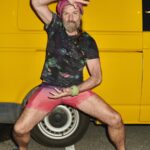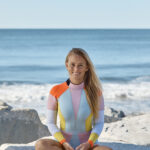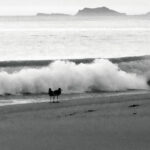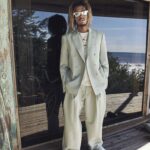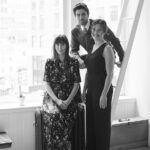Dr. Sylvia Earle is a pioneering oceanographer and marine biologist. She was among the first to use scuba gear and has spent over sixty years exploring and observing our oceans. Her insatiable sense of wonder fuels her passion for both discovery and actionable solutions. Earle’s organization, Mission Blue, is committed to instigating change through hope and education.
Alison Beckner: Svadhisthana means “the dwelling place of the self.” What does this mean to you?
Sylvia Earle: I am most at home in three places: when I am literally, at home, with family and friends; at my desk, thinking or writing creatively, or in any wild natural place, land or sea, but especially underwater. I am least “at home” in manicured environments, densely populated by people with little contact with nature.
AB: What emotions do you most feel when you are in water or when you are on a mission?
SE: Water has many forms. In a storm, there’s great power. Storms are exhilarating. Sometimes frightening, but exhilarating. But the different forms that water takes from cloud to ice to liquid, and the liquid being of course the ocean, fresh water streams—We can associate emotions with water’s movement whether they’re crashing waves or beautiful sunset pictures, a mirror, the calm sea reflecting a beautiful sunset.
AB: What are your thoughts on flow?
SE: I recognize the many ways all things are connected, that I—like all living things—am inextricably linked to the past, present, and future of life on Earth.
AB: Do you ever experience guilt?
SE: I feel remorse for missing experiences with my family, especially my children but also my parents, grandchildren, and special friends, owing to a fierce commitment that occupies much of my time: to do everything I can to explore, understand, and communicate discoveries about the ocean, and to motivate action to protect wildlife and wild places, land, and sea.
AB: Thoughts on creativity? Sexuality?
SE: One of the great miracles of life is the unique nature of every individual—every cat, dog, horse, tree, flower, fish—and every human being. Fingerprints, faces, behavior, history and one-of-a-kind chemistry, originate in the genetic makeup of each living creature and each is impacted by environment and experience, whether the individual is a person, a whale, or a pine tree. Another “miracle” is the common chemistry of life that links humans to other mammals but also to grasshoppers and squid, bacteria and beans.
Sexuality? Mixing of genetic material helps ensure that variations will result, and that connections will be maintained from one generation to another.
Creativity? Humans are not unique in adapting to whatever conditions they are in, in solving problems, in remembering the past and anticipating the future. But humans are the only creatures able to develop the technologies to travel outside earth’s atmosphere, to dive to the ocean’s greatest depth, to gather, store and transmit information to others globally. We are also the only creatures able to destroy the systems that keep us alive and thereby bring about our own extinction—along with much of the rest of life on earth.
AB: You have a deep and long-term relationship with water, the sea, ocean life, and your breath. What does that look like to you? Does that trust ever falter?
SE: The one thing all living things require is water. Just try going without it for a while! An ocean, the lake, the stream,—it’s not just water, it’s water filled with living things. That’s what attracts me. Great diversity of creatures, each with its own nature. No two are exactly alike and yet we’re all connected by a common chemistry.
AB: What has your career path allowed you to tap into? What gifts has it brought to you? Physical, emotional, or mental?
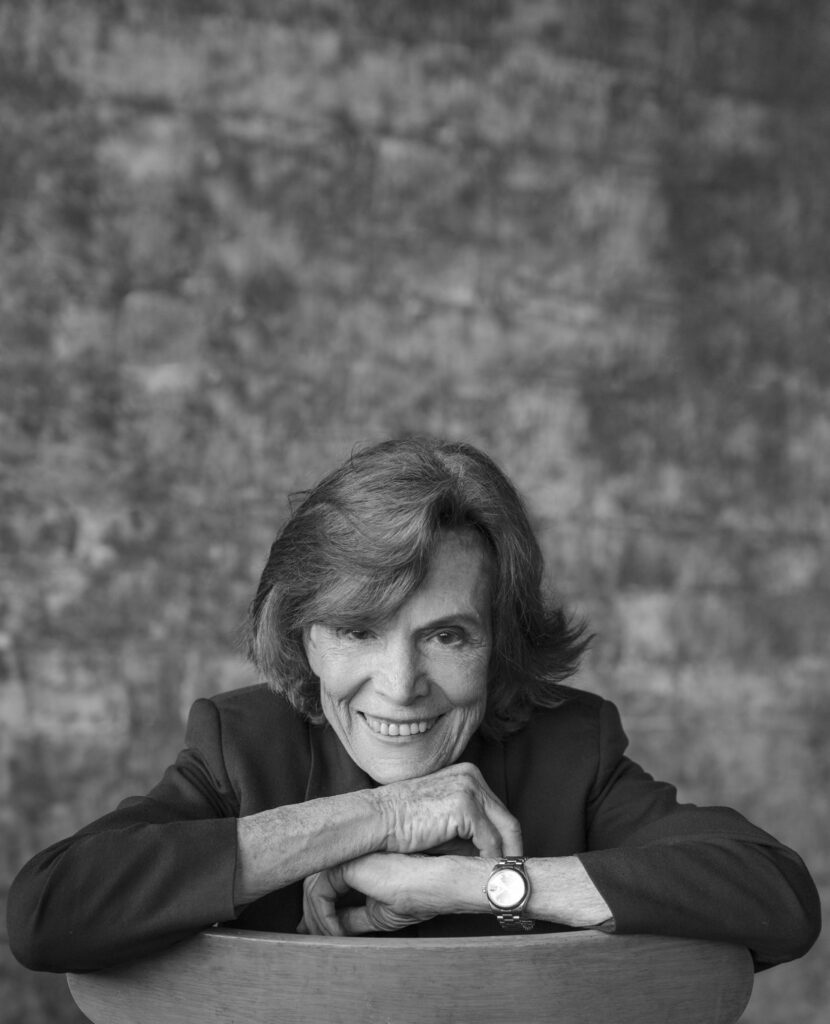
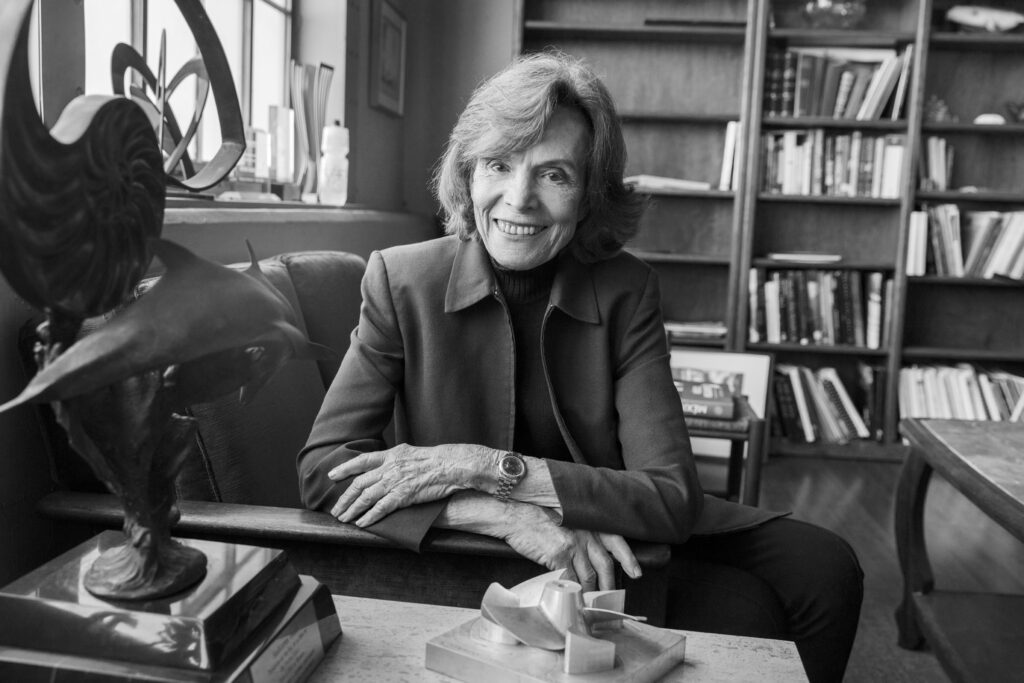
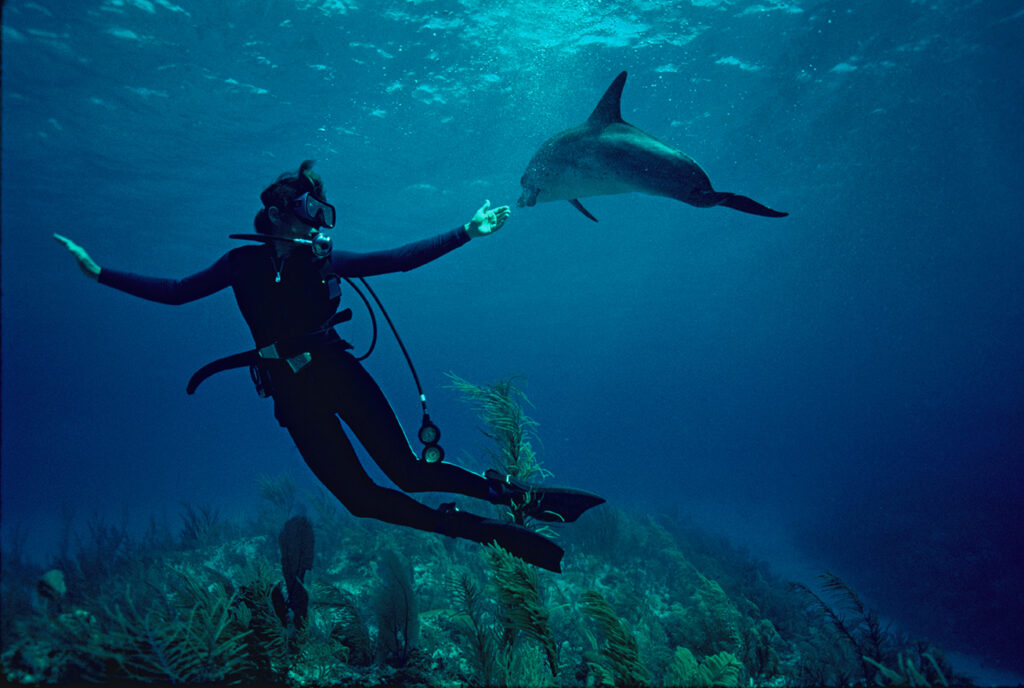
Photo: Courtesy of Sylvia Earle and Hope Spots Company Inc.
SE: It’s curiosity that drives me as a scientist. Every child is curious. I think it’s not just human children. You see it in kittens and you see it in puppies and you see it in all young things as they arrive in the world. This curiosity about What is the world? Who am I? Where does that come from? Where am I going? But humans perhaps have that developed to a greater degree than most. We have been able to document the world around us. To gather information and then pass it along to the next generation. I, like every child I supposed, have been fascinated with the nature of the world around me. And over a lifetime as a scientist exploring and questioning and trying to see how we are impacting the natural world and of course how the planet affects us. We couldn’t exist without water, we couldn’t exist without the rest of life on earth. We’re all connected. And I think it’s just as straightforward as that.
We couldn’t exist without water, we couldn’t exist without the rest of life on earth. We’re all connected. And I think it’s just as straightforward as that.
AB: You have been able to create a long, significant, and impactful career out of what is basically this curiosity that we have as beings on earth.
SE: Everybody has that capacity to ask questions and never stop asking. Children are born with it. Somewhere along the way a lot of people give it up and stop asking questions, stop seeking the answers: Who are they? What’s the world all about? They fall into routines and somehow lose that edge. I don’t know why. Every day is exciting and you never have all the answers, so there’s no reason to stop asking. That’s what keeps society going, those who all their lives not only ask “why?” but “why not?” and continue to push the edge. Everybody should in their own way.
AB: Have you ever faltered in that yourself? Have you ever had moments where you thought, “This is so discouraging” or “this is so frustrating or challenging”?
SE: Well, no one can know it all. With what physicists learn about the universe beyond what astronomers discover, it’s all information that gets shared — I can benefit from that and so can you. When I go into the ocean and explore, not everybody can do that, but I come back and share the view. And anyone has access to that. That’s the special nature of humans. We are individuals and each of us has super powers of one sort or another. Some are good with numbers or with art or with words or with music or you name it. So together we have this amazing society with so much wealth of knowledge that we can tap into. That’s perhaps what has caused us to go from where we were ten thousand years ago to where we are today.
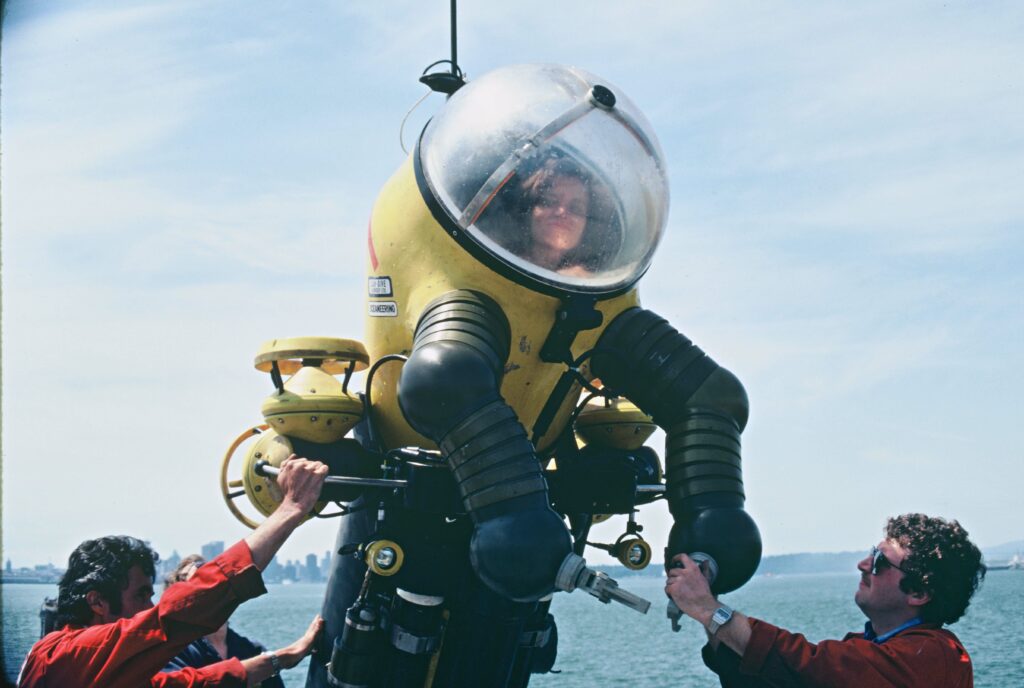
Photo: Courtesy of Sylvia Earle and Hope Spots Company Inc.
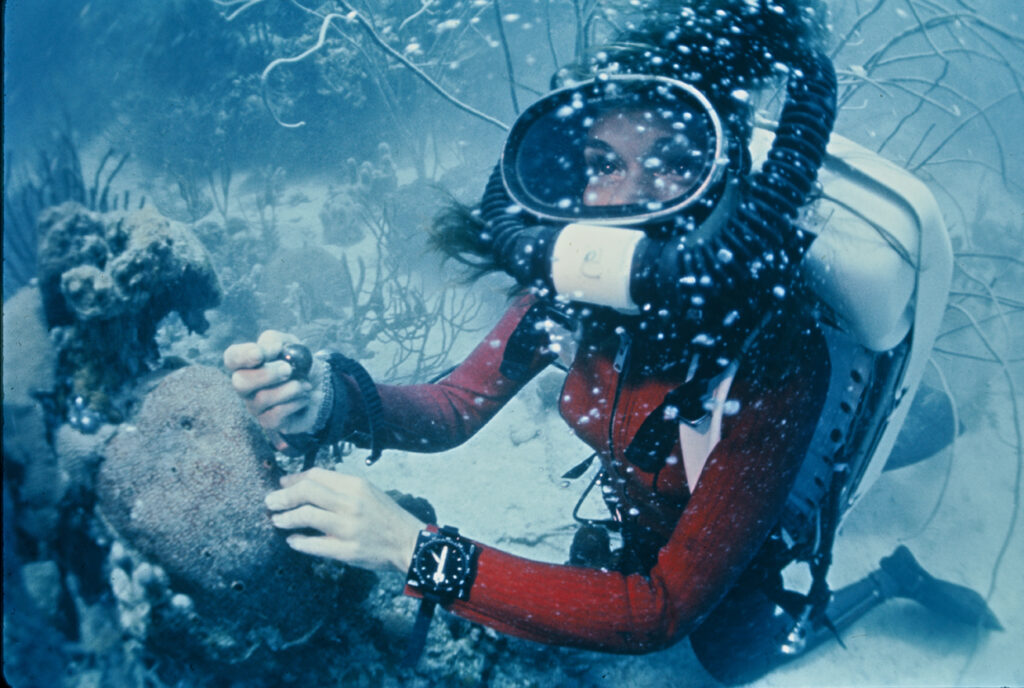
Photo: Courtesy of Sylvia Earle and Hope Spots Company Inc.
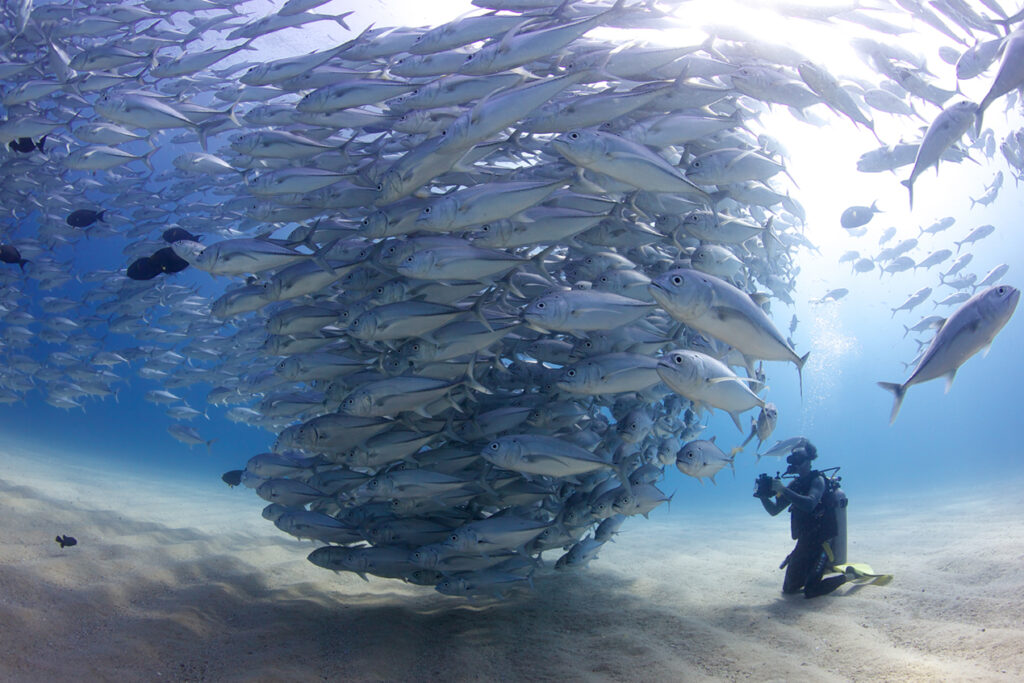
Photo: Courtesy of Bryce Groark and Hope Spots Company Inc.
For the first time, we are really able to see things that were not knowable, even by the smartest people who lived half a century ago, because we have harnessed technology to take us high in the sky, and deep in the sea. We communicate at a level that is unprecedented. And while there are more people on the planet than the planet can sustain, we do have seven billion minds and that’s cause for some hope—if we apply ourselves, use our talents, use our skills. The knowledge is there. We can see that there are limits to what we can do to this amazing place in the Universe, but this is home. We have treated our home as if there are no limits. That we can take what we want, we can kill the rest of life on earth at will. Not worrying about consequences.
We have treated our home as if there are no limits. That we can take what we want, we can kill the rest of life on earth at will. Not worrying about consequences.
But now we know. That’s the key. If you’re ignorant, you are blissfully unaware and continue doing whatever it is that has gotten you to where you are. But once you can pull back as we now can, with the shared knowledge that is out there, it’s the first time that we’ve been able to see the whole world as a single system and begin to measure our impact. And it’s also the first time when we may be able to do something about it because we are connected with communication systems that didn’t exist before.
I guess the big challenge of our time is whether we have the will to use our individual and collective power that will enable us not to destroy ourselves.
AB: What is your dream for humanity, for the planet, and for earth?
SE: Everyone says that we have to make peace, but we have to first make peace with nature, especially water. Not contaminate it. Not wantonly waste it. And to realize that we’re here as a result of four and a half billion years of forms of life that preceded us. Long before there were humans, there were processes in motion that shaped the world in ways that have been favorable to us.
It’s taking us a very short time to unravel those very systems that have taken literally hundreds of millions of years, billions of years to develop. The air we breathe, the water cycle, the nitrogen cycle, the carbon cycle, all those things that we should be teaching kids when they’re five years old about why they should protect the natural world because our lives truly depend on it. It’s not a luxury to have a national park. It isn’t a luxury to protect water from contamination. It’s just common sense. It keeps us alive.
AB: Where are people learning to do this? And then where is it being facilitated? What can they do if they want to help?
SE: You look in the mirror and you say, What is my power? What do I do? Who am I? And no one is the same. No one can do everything but everyone can do something. The point is to be mindful that there is no “away” on the earth when we generate trash. We should be responsible for putting it where it’s not going to do harm. It starts with individuals always answering that question, what can I do? And then doing it.
AB: What is your superpower?
SE: I think I have something special to offer because I’m a witness—having been to places, seen things that most people don’t get to see. So I have a perspective that comes from being around at a remarkable time, we can know what we know and maybe, for the last time, heal the harm and reverse the trends that are leading to potentially the extinction of humankind. We have enough of the pieces of a big puzzle about who we are, where we’ve come from, where we might be going, not perfectly accounting for all the answers to the questions but we know more than has ever been known before. And we can see the direction and we know that we’re in trouble and that’s a good starting place. Maybe my role and part, is to help others see what they can’t see for themselves. Show them what I see. I’m not alone in this for sure, but there are many people who are really complacent. They don’t understand that we have a planet that has kept us safe throughout all of our history, but now it’s our job to keep the planet safe for us and for all the other forms of life that rely on conditions that are currently in place. We need to listen up, wake up, protect the ocean, protect ourselves, protect our air, water, the foundation of what makes earth exceptional in a universe of hostile places. Treat it as if we need it, and we do.
AB: Is there anywhere that you haven’t been that you would still like to go?
SE: Most of the ocean has never been seen by anybody, let alone really explored. I’d like to spend much more time in the deep sea. There is so much that no human has ever witnessed before. Most of the world is yet to be seen. It just happens to be underwater. Who wouldn’t want to go check it out? I do. Don’t you?
AB: What does “human shift” mean to you?
SE: We have to move from where we are to a better place. If we keep moving in the current direction of consuming the natural world and coming in conflict with one another, looking at the dark side of who we are, we will go the way of many creatures that have not survived long on the earth. But we have the special capacity to make a plan. To see what other creatures cannot. We have the power of knowing.
We have to shift our attitude about one another, about the importance of nature, and realize that everything we care about is dependent on embracing and respecting the natural world. And doing everything we can to restore health to the systems that have been so damaged throughout all preceding history. We are really good at killing. We’re really good at consuming. What will it take? What wake up call to shift humankind? We have to shift. It’s our job to keep the planet safe.

